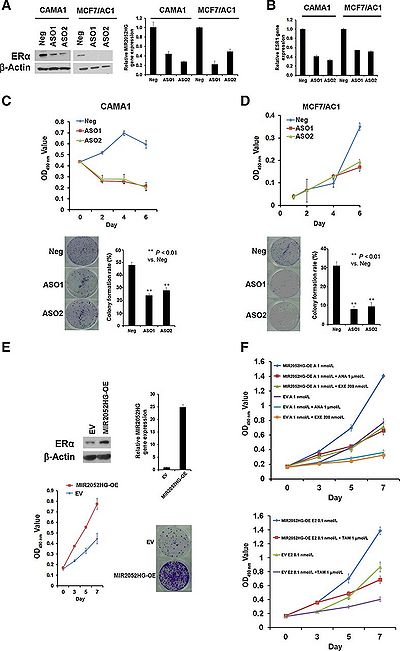Difference between revisions of "MIR2052HG"
(Created page with "==Annotated Information== ===Approved Symbol=== MIR2052HG ===Approved Name=== MIR2052 host gene ===Previous Symbols=== _ ===Synonyms=== _ ===Chromosome=== 8q21.11-q21.13 ===Re...") |
Jiabao Cao (talk | contribs) (→Function) |
||
| (One intermediate revision by the same user not shown) | |||
| Line 1: | Line 1: | ||
| + | |||
==Annotated Information== | ==Annotated Information== | ||
| − | === | + | ===Name=== |
| − | MIR2052HG | + | MIR2052HG:MIR2052 host gene |
| − | === | + | ===Characteristics=== |
| − | + | MIR2052HG(other names:FLJ39080, LOC441355) is a LncRNA gene located on chromosome 8q21.11.<ref name="ref1" /> | |
| − | === | + | ===Function=== |
| − | + | [[File:MIR2052HG func.jpg|right|thumb|400px|'''The Knockdown of MIR2052HG'''<ref name="ref1" />.]] | |
| − | = | + | MIR2052HG affects ESR1 and ERα expression and proliferation, colony formation, and response to AIs in ERα-positive breast cancer cell lines.<ref name="ref1" /> |
| − | + | ||
| − | === | + | ===Regulation=== |
| − | + | Functional genomic studies in lymphoblastoid cell lines and ERα-positive breast cancer cell lines shows that expression from MIR2052HG and the ESR1 gene encoding estrogen receptor-α(ERα) is induced by estrogen and AI(aromatase inhibitors) in a SNP-dependent manner. <ref name="ref1" /> | |
| − | === | + | |
| − | + | ===Expression=== | |
| − | === | + | MIR2052HG is expressed in multiple breast cancer cell lines, including ERα-positive cell lines, according to the Cancer Genomics Hub.<ref name="ref1" /> |
| − | + | ===Diseases=== | |
| − | == | + | Breast Cancer<ref name="ref1" /> |
| − | + | ||
| − | == | + | ==Labs working on this lncRNA== |
| − | + | *Division of Medical Oncology, Mayo Clinic, Rochester, Minnesota. | |
| + | ==References== | ||
| + | <references> | ||
| + | <ref name="ref1"> | ||
| + | James N. Ingle, Fang Xie, Matthew J. Ellis, Paul E. Goss, Lois E. Shepherd, Judith-Anne W. Chapman, Bingshu E. Chen, Michiaki Kubo, Yoichi Furukawa, Yukihide Momozawa, Vered Stearns, Kathleen I. Pritchard, Poulami Barman, Erin E. Carlson, Matthew P. Goetz, Richard M. Weinshilboum, Krishna R. Kalari and Liewei Wang. Genetic Polymorphisms in the Long Noncoding RNA MIR2052HG Offer a Pharmacogenomic Basis for the Response of Breast Cancer Patients to Aromatase Inhibitor Therapy. Cancer Res December 1 2016(76)(23) 7012-7023 | ||
| + | </ref> | ||
| + | </references> | ||
Latest revision as of 13:22, 26 November 2017
Contents
Annotated Information
Name
MIR2052HG:MIR2052 host gene
Characteristics
MIR2052HG(other names:FLJ39080, LOC441355) is a LncRNA gene located on chromosome 8q21.11.[1]
Function

The Knockdown of MIR2052HG[1].
MIR2052HG affects ESR1 and ERα expression and proliferation, colony formation, and response to AIs in ERα-positive breast cancer cell lines.[1]
Regulation
Functional genomic studies in lymphoblastoid cell lines and ERα-positive breast cancer cell lines shows that expression from MIR2052HG and the ESR1 gene encoding estrogen receptor-α(ERα) is induced by estrogen and AI(aromatase inhibitors) in a SNP-dependent manner. [1]
Expression
MIR2052HG is expressed in multiple breast cancer cell lines, including ERα-positive cell lines, according to the Cancer Genomics Hub.[1]
Diseases
Breast Cancer[1]
Labs working on this lncRNA
- Division of Medical Oncology, Mayo Clinic, Rochester, Minnesota.
References
- ↑ 1.0 1.1 1.2 1.3 1.4 1.5 James N. Ingle, Fang Xie, Matthew J. Ellis, Paul E. Goss, Lois E. Shepherd, Judith-Anne W. Chapman, Bingshu E. Chen, Michiaki Kubo, Yoichi Furukawa, Yukihide Momozawa, Vered Stearns, Kathleen I. Pritchard, Poulami Barman, Erin E. Carlson, Matthew P. Goetz, Richard M. Weinshilboum, Krishna R. Kalari and Liewei Wang. Genetic Polymorphisms in the Long Noncoding RNA MIR2052HG Offer a Pharmacogenomic Basis for the Response of Breast Cancer Patients to Aromatase Inhibitor Therapy. Cancer Res December 1 2016(76)(23) 7012-7023